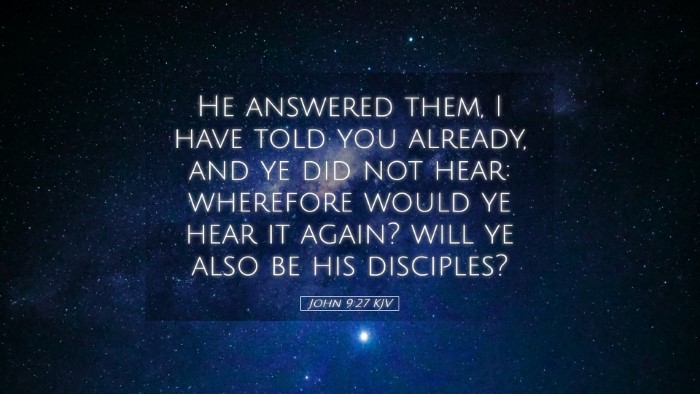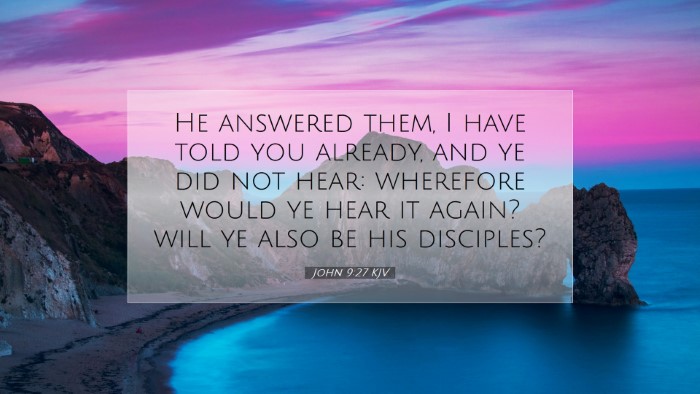Commentary on John 9:27
In John 9:27, we find a pivotal moment in the narrative of the healing of the man born blind. This verse encapsulates the response of the healed man to the interrogations imposed upon him by the Pharisees. It is an important text for understanding issues of faith, authority, and the nature of spiritual blindness.
Text of John 9:27
"He answered them, I have told you already, and ye did not hear: wherefore would ye hear it again? will ye also be his disciples?"
Context and Background
This verse comes after the miraculous healing of a man who had been blind from birth. This miracle serves as a focal point for the conflict between Jesus and the Pharisees, showcasing not only the power of Jesus but also the spiritual blindness of the religious leaders of the day. The healed man’s response is significant as it reflects both his frustration and his growing understanding of Jesus’ identity.
Insights from Commentaries
-
Matthew Henry
Henry emphasizes the boldness of the man born blind in his confrontation with the Pharisees. His retort reflects a realized faith and a move towards discipleship, as he implies that they ought to be more willing to listen and understand the miracle that has taken place. Henry points out that the healed man’s challenge reveals the absurdity of the Pharisees’ refusal to accept Jesus’ authority and highlights the difference between the appreciation of the miracle by the common people and the skepticism of the religious elites.
-
Albert Barnes
Barnes focuses on the rhetorical aspect of the healed man's questions. By asking, "Will ye also be his disciples?" he not only challenges the Pharisees but also aligns himself with Jesus in a manner that signifies his acceptance of Jesus as his teacher. It signifies a pivotal shift in the man's own position from a mere recipient of a miracle to an advocate for Jesus and his teachings. Barnes also notes that this reflects a deeper truth about the nature of spiritual enlightenment; those who receive it are often those who are marginalized by the religious elite.
-
Adam Clarke
Clarke points out that the man's question signifies an appeal to reason and authority. The healed man had already articulated his experience of healing, and the repetition of his testimony serves to confront the hypocrisy of the Pharisees. Clarke emphasizes the irony in the situation: the man born blind, once considered a sinner by social standards, becomes a voice of truth while the Pharisees, who are supposed to be teachers of the Law, reveal their own spiritual blindness. This calls into question the oft-held notion of spiritual authority within the Jewish religious framework.
Theological Reflections
John 9:27 serves as a profound illustration of the theme of spiritual blindness versus spiritual sight, a recurring motif in the Gospel of John. The healing of the blind man is not only a physical restoration but also a metaphor for the coming to faith. The man’s insistence on recounting his experience challenges the leaders to recognize the truth in their midst. The theological implications extend to understanding the nature of discipleship; it is not merely about following rules but about recognizing and responding to Jesus’ transformative power.
The Role of Testimony
Both the context and the man’s rhetorical questioning underline the significance of personal testimony in the Christian faith. The healed man’s experience becomes a crucial component of his identity. His willingness to stand firm in his testimony, even in the face of opposition, encourages believers to share their experiences and uphold the truth of the Gospel amidst skepticism. Such testimony is robustly supported in the public domain commentaries, suggesting that the evidence of a changed life is a powerful witness to the reality of Christ.
Spiritual Authority and Discipleship
This passage further illuminates the concept of authority in spiritual matters. The healed man’s challenge to the Pharisees presents a stark contrast between human authority rooted in tradition versus divine authority rooted in miraculous truth. This is significant for pastors and theologians who seek to understand the dynamics of spiritual leadership today. The expectation of true discipleship entails a willingness to follow Christ, which may not align with established norms or conventional wisdom.
Conclusion
John 9:27 stands as a powerful testimony to the work of God in the lives of individuals who are open to His truth. The insights drawn from historical commentaries by Matthew Henry, Albert Barnes, and Adam Clarke provide depth to our understanding of this pivotal moment. Believers are challenged to reflect on their own spiritual journeys, to advocate for truth, and to recognize the source of real authority and understanding in their lives. This verse calls the modern church to be vigilant against spiritual blindness while promoting a faith that is vibrant, personal, and actively engaged in the world around us.


